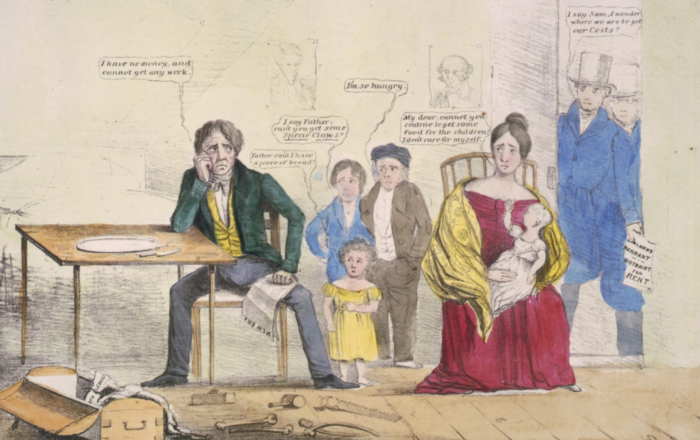
How could this happen? We are the wealthiest country in the world by far, and our unemployment system was supposed to be able to weather an economic crisis.
As you may know through personal experience or that of a friend or family member, following the coronavirus-related shutdowns started in March, millions of unemployed Americans waited several weeks or months to collect benefits.
In the time since, for many, payments have only come sporadically. A check might show up one week, but not the next three. Or four, or five; it’s random, completely unpredictable, and infuriating.
Even uglier is that an additional 20 million unemployed Americans were either denied benefits outright or are still waiting for decisions on their claims—without any timetable or indication as to if or when they will collect, and without any ability to contact unemployment offices to find answers.
Due to delayed or stalled unemployment payments, there are horrifying reports from across the country of people facing evictions and food shortages. One-third of Americans currently have outstanding rent or mortgage payments. Meanwhile, the 30 million Americans now on unemployment insurance—receiving either partial or full benefits—are left dangling as the Trump administration argues with state leaders about who will pay for a pledged extension of the CARES Act unemployment program. As Forbes reported on Thursday, “the Department of Labor (DOL) issued an unemployment insurance program letter to state agencies providing guidance on how to administer the extension of federal unemployment benefits, technically known as Lost Wages Assistance (LWA). The most important paragraph in the letter confirms that eligible Americans may only receive an LWA payment of $300 per week, not the $400 that Trump had promised when he issued the executive memorandum.” The implementation of this new initiative is likely to delay payments even further.
How could this happen? We are the wealthiest country in the world by far, and our unemployment system was supposed to be able to weather an economic crisis—a central purpose of the federal unemployment insurance law, passed in 1935, was to stabilize the economy in an emergency and prevent the kind of suffering experienced by millions of unemployed Americans during the Great Depression. Our unemployment system has failed to carry out its most basic foundational objective: to provide timely relief to the unemployed during a crisis.

The usefulness of the 1935 UI legislation in mitigating against disaster was based on the idea that in prosperous times, states would build up a reserve of resources to prepare for economic downturns. Instead of being prepared for the coronavirus pandemic, however, state departments of labor said they didn’t have the staff to handle the large number of unemployment claims.
A former commissioner of the Maine Department of Labor, for example, said that Maine and other states “had neither the resources nor the infrastructure to meet the need.” As Bloomberg reported: “For years, state unemployment systems – predominantly federally funded – have steadily fallen behind in technology and program modernization. They simply were not equipped to handle a crisis of this magnitude.”
Current commissioner for the Maine Department of Labor Laura Footman claimed they were blindsided by the pandemic, as if COVID-19 came out of nowhere. People were warned months in advance of the virus’s likely impact on society and economy, yet most state unemployment bureaus took no action prior to the shutdowns. The Maine DOL, for instance, had the same number of staff members in late March as it did at the start of 2020—14.
According to federal unemployment insurance law, no special preparations should have been required. Again, the point of the measure was to have the infrastructure and funding already in place to deal with a crisis. In 1937, the US Social Security Board defined unemployment insurance as:
A method of safeguarding individuals against distress for a short period of time after they become unemployed…Instead of making the individual get along on a steadily descending level of living until he/she has exhausted the last shred of his/her savings, credit, and the generosity of his relatives and friends, thus reaching a point of destitution…unemployment insurance plans set aside contributions during periods of employment. [emphasis added]
That didn’t happen. Since the 2008-2009 recession, states have cut benefits for unemployed workers, and in doing so made it far more difficult for workers to obtain any benefits at all.
“Underinvestment has left many states,” Bloomberg noted, “with unemployment programs that can seem more designed to slow payments than expedite them.” Andrew Stettner, who conducts studies on unemployment for the Century Foundation, added: “States that have been the most restrictive in moving people off unemployment insurance — those states have had the hardest time processing claims now.”
By delaying payments for weeks and months on end this year, state unemployment bureaus are cruelly and needlessly pushing millions of Americans into poverty and despair.
Given how inexcusably unprepared they were for the pandemic, the Department of Labor and state governments could and should have, at the very least, adapted their practices to meet the moment and to provide quick relief during a crisis—by, for example, paying claims first and investigating later. (Vermont showed how it could be done by giving out $1,200 checks, in mid April—to all those who still had unresolved claims.) Instead, other states acted as if we are living in normal times, relying on existing, stringent rules and procedures, which are focused on investigating, denying, and delaying claims, rather than efficiently processing them.
“In a time when pretty much everybody who’s applying should be eligible,” Steve Gray, director of Michigan’s Unemployment Insurance Agency, noted, “we’re working with a system that got us to a 26 percent recipiency rate.”
This is the fundamental problem with our unemployment insurance system: current regulations and restrictions exist to trip up applicants and deny as many claims as possible. This is not a workable model for an economic crisis—defeating as it does one of the main objectives of the unemployment law—nor a humane society.
In addition to attributing stalled payments to the large number of claims, states were also quick to blame fraudulent claims.
In June, Massachusetts Gov. Charlie Baker defended the state for its delays, citing fraud: “They’re entitled to [the money], but it’s also very important to us that they, in fact, be the people that their application says they are.”
This takes months to figure out?
Investigators identified a Nigerian fraud scam as a main culprit. That certainly affected people and systems in numerous states, including Mass and Maine, but it also highlights the need to overhaul the system—if state agencies can’t tell the difference between scams and legitimate claims—or if it takes them several weeks or months to do so—then we need radical adjustments. If because the system is so complicated it takes months to train new staffers—hardly a good setup for a crisis—then uncomplicate the regulations. And if there are staff shortages, hire more people—after all, it’s not as if there is a shortage of Americans looking for work right now. In fact, they’re conveniently lined up at the (virtual) door of these unemployment offices.
If states including Mass hired enough staff to handle in-person claims, it could eliminate fraud while significantly expediting legitimate claims. If Baker and lawmakers were truly concerned about both verifying identities and making sure unemployed workers are getting paid, they’d call for reforms along those lines.
Mark Grueter has a PhD in History with a focus on the labor movement in the United States.

